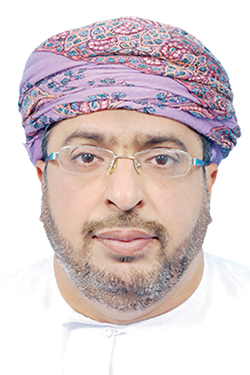

Haider Al Lawati - haiderdawood@hotmail.com - The Gulf region, including the Sultanate, recently witnessed a number of events and seminars on the uses of ‘blockchain’ to get acquainted with these new technologies. Meanwhile, the importance of this network is on the rise due to its major ability to change people’s lives and fortunes, especially in the world of economy and eliminating the current bureaucratic approach in many socioeconomic issues that people face.
No doubt, the Sultanate’s approach and its desire to become an attractive global investment hub requires the institutions concerned to adopt the latest in the world of modern technology, especially in the field of digital clusters at the enterprise and business level.
The Omani initiative was launched by the Ministry of Foreign Affairs in November last year by addressing the topic at the local level through workshops attended by representatives of other stakeholders.
Over 700 people from the public and private sectors attended the workshops, with a group of international speakers sharing their vision and expertise on harnessing this technology in the field of business, finance, banking and government services.
These technologies have the potential to contribute in raising the security and efficiency of dealing with money, mutual assets and information, not to mention creating new jobs and employment opportunities.
Blockchain transaction technology is the brainchild of the Japanese inventor Satoshi Nakamoto, and has been widely recognised as one of the most innovative technologies since the creation of the Internet and has the potential to revolutionise the financial services industry and banking.
Data indicates this platform is essentially an information-distribution document that no individual, institution or government can change or alter, which means unmatched levels of transparency and security.
Many consulting firms around the world describe the new and emerging Blockchain technologies as essential to support and realise the digital economy in the Middle East, while ensuring effective protection against the growing threats of data security and cyber crime.
As Gulf governments seek to create some of the world’s smartest cities amidst a culture of innovation, this technology, as consultants see it, can provide smooth and effective ways to protect smart cities and enable their development, encrypt digital transaction systems and develop a new ecosystem to propel the economy to growth.
This network reduces/ shrinks files, but with more complexity than the Worldwide Web such as torrent files through the use of powerful computers and mathematical algorithms.
With growing focus of GCC states on technological innovation in line with the growing proliferation of Internet services, Blockchain technology will provide a high-security infrastructure through its ability to measure, perform and adapt to the rapidly expanding digital economy.
The advantages of Blockchain technology include containing a system that has the ability to link different institutions to form an encrypted and hard to hack or penetrate IT infrastructure, contributing to the coordination of joint projects between institutions in the same country.
For example, the “Invest Easy” project, established by the Ministry Commerce and Industry, requires the link between several government agencies, which simplifies procedures for investors and allows faster and more flexible transactions and smooth financial transfers.
This technology has become a necessity for economies of the Middle East and North Africa region, which is going through a phase of rapid change resulting from governments’ approach towards adopting the process of economic diversification away from dependence on oil.
This requires them to keep up with all the challenges and speed up the establishment of smart cities to support national programmes in this regard, and be prepared to face threats ranging from electronic piracy and crime by using Blockchain technologies to achieve the objectives of the digital economy, along with acceleration of production processes and combating corruption.
Oman Observer is now on the WhatsApp channel. Click here



